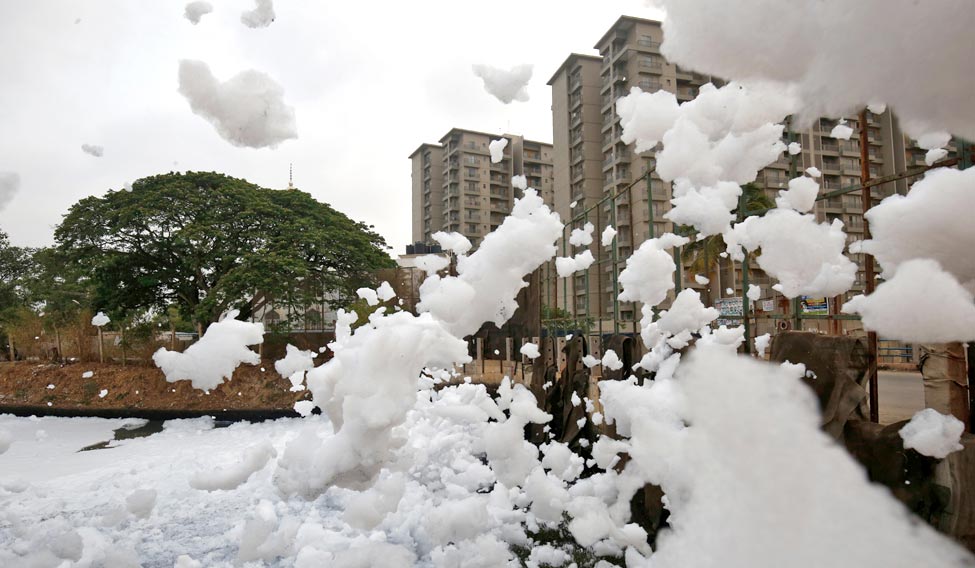A day after the principal bench of the National Green Tribunal (NGT) in New Delhi ordered closure of all the industries in the vicinity of the frothing Bellandur Lake, the industry and trade bodies are up in arms against the state government alleging criminal negligence for the blanket ban on industries.
Interestingly, the Karnataka State Pollution Control Board started issuing closure notices to 97 polluting units even as the Tribunal was busy giving the ruling, on Wednesday. According to KSPCB officials, a preliminary report prepared by them has identified 486 industries across the 5km radius of the lake. Of this 97 water-dependent units, mostly small-scale industries engaged in dyeing, leather and automobile repair have been issued notices. Officials also claimed that going by the NGT order, the rule will be applicable to the entire catchment area, which accounts for 40 per cent of the city.
While citizen groups and environmentalists have welcomed the NGT order and demanded captive effluent treatment plants and checking inflow of untreated domestic waste into the lake, the industry and the builders are a worried lot and it is estimated as many as 500 housing projects are stuck owing to the confusion over the Tribunal's buffer zone stipulations for lakes and stormwater drains.
"Are industries cropping up illegally in the state? Any industry can come up only after the statutory requirements are met, like government permits, trade licenses, electricity connections, environment clearance, among others. Why punish all industries for the fault of a few? Do our bureaucrats need orders from the top (NGT) to do their job? The aggrieved units will definitely seek legal remedy. But my contention is, is there any sanctity for the government's approvals?” said M.C. Dinesh, president of Federation of Karnataka Chamber of Commerce and Industry.
The industry dubbed the move as "arbitrary" and demanded as to why the government did not consult the stakeholders like FKCCI or trade bodies. "Is this how the state government hopes to build confidence of entrepreneurs and investors? Industries generate employment and investors carry the burden of huge bank loans. Why is the industry made to pay for bureaucratic failure to curb polluting units? This will send a wrong message to the potential investors too. The industry is already buckling under power tariff hike and Minimum Wages act. How will industries repay loans or run businesses help in employment generation,” contended Dinesh.
On Wednesday, the Tribunal, in its interim directives to immediately arrest the further decay of the lake, ordered the local authorities to ensure that no untreated sewage enters the lake and no waste—municipal, domestic or CMD is dumped into the lake, or in the buffer zone prescribed by NGT. In case of dumping, a compensation of Rs 5 lakh will be levied on the offender. The order brought cheer to the residents of the locality, who have been suffocating due to the stench and frothing of the lake and mosquito menace.
In a major embarrassment to the state government, the Bruhat Bengaluru Mahanagara Palike, and Karnataka Urban Development Department had to tender an unconditional apology to the principal bench, even as the two bodies committed to immediately withdrawing its circular providing exemption to the buffer zone stipulated by the NGT in its May 4, 2016 order. While NGT had extended the buffer zone around lakes and wetlands from 30 metres to 75 metres, the BBMP had allowed building construction and layouts of those which had procured sanctions prior to the NGT order.
It may be recalled that the Siddaramaiah government was also pulled up by the Tribunal for doing little to plug the discharge of untreated sewage into the lake, which froths and breaks into fire. In its hearing on April 12, 2017, NGT warned of passing restraining directions against the state of Karnataka, if the discharge of untreated sewage into the lake is not stopped immediately. It directed the government and local authorities to appraise the court of the measures taken after the lake fire incident on February 16, 2017.





